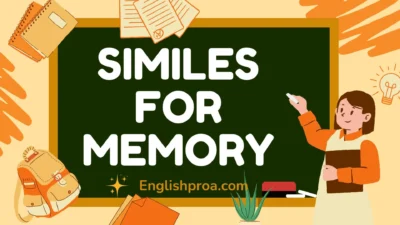War is a heavy word. It brings with it images of conflict, struggle, and often, deep pain—not just on the battlefield, but in our everyday lives, relationships, and inner worlds. In this article, I want to explore 30 similes for war that can help you express these feelings and realities in a more compassionate, thoughtful, and emotionally intelligent way.
Whether you’re a writer, a speaker, or someone trying to make sense of your own battles, these similes offer language that resonates.
War is like a storm on the horizon
Meaning: It signals inevitable chaos and danger.
In a sentence: Her silence was like a storm on the horizon—something big was coming.
Best use: In emotional build-ups or foreshadowing.
Not for use: In casual conversations or lighthearted contexts.
Other ways to say: Like thunder in the distance, like clouds brewing above.
War is like a wildfire out of control
Meaning: It spreads rapidly and destroys everything in its path.
In a sentence: The argument spread through the office like a wildfire out of control.
Best use: To describe escalating conflict.
Not for use: For minor disputes or disagreements.
Other ways to say: Like a spark in dry grass, like a flame without rain.
War is like a chess game with real lives at stake
Meaning: Strategic, calculated, but deeply serious.
In a sentence: Their legal battle was like a chess game with real lives at stake.
Best use: In intellectual or legal confrontations.
Not for use: In playful competition.
Other ways to say: Like a battlefield of minds, like strategy turned to sorrow.
War is like a broken symphony
Meaning: What could have been beautiful is now disharmony.
In a sentence: Their friendship had become like a broken symphony.
Best use: To describe emotional or relational conflict.
Not for use: In political or military contexts.
Other ways to say: Like a song off-key, like music turned to noise.
War is like a knife to the soul
Meaning: Deeply wounding, emotionally or spiritually.
In a sentence: That betrayal was like a knife to the soul.
Best use: In poetry or personal reflection.
Not for use: In formal or analytical writing.
Other ways to say: Like a blade in the heart, like cutting through spirit.
War is like a shadow that never leaves
Meaning: A lingering, haunting presence.
In a sentence: The trauma of that time was like a shadow that never left.
Best use: In trauma-informed writing or memoirs.
Not for use: In humor or satire.
Other ways to say: Like a ghost by your side, like darkness that clings.
War is like fire in the bones
Meaning: An inner burning that won’t go away.
In a sentence: Her anger was like fire in the bones—unshakable and raw.
Best use: To describe passion or pain.
Not for use: In logical or detached narratives.
Other ways to say: Like burning coals inside, like inner embers.
War is like a mirror shattered by hate
Meaning: Identity and unity are broken by conflict.
In a sentence: Their community was like a mirror shattered by hate.
Best use: In social commentary or human rights writing.
Not for use: In superficial or sarcastic tones.
Other ways to say: Like unity split in two, like reflection torn apart.
War is like a storm in the mind
Meaning: Mental and emotional chaos.
In a sentence: His PTSD was like a storm in the mind.
Best use: In mental health discussions.
Not for use: When describing physical conflict only.
Other ways to say: Like mental thunder, like clouds of fear.
War is like a river of blood and silence
Meaning: It combines violence with trauma and grief.
In a sentence: History books often read like rivers of blood and silence.
Best use: In historical or poetic contexts.
Not for use: In casual conversation.
Other ways to say: Like silence soaked in pain, like history dripping red.
War is like poison in the veins of society
Meaning: It spreads negativity and harm throughout a culture.
In a sentence: Propaganda acted like poison in the veins of society.
Best use: In social or political critique.
Not for use: In personal stories without broad implications.
Other ways to say: Like toxins in the bloodstream, like decay in the heart.
War is like ice in the heart
Meaning: It numbs compassion and empathy.
In a sentence: After years in combat, his emotions felt like ice in the heart.
Best use: In trauma or transformation narratives.
Not for use: In lighthearted writing.
Other ways to say: Like a heart gone cold, like empathy frozen.
War is like a wound that never heals
Meaning: Long-term pain and damage.
In a sentence: The aftermath was like a wound that never healed.
Best use: In emotional writing, especially about grief.
Not for use: In temporary or minor issues.
Other ways to say: Like a scar that aches, like bleeding without end.
War is like a lion uncaged
Meaning: Fierce and uncontrollable.
In a sentence: Her fury was like a lion uncaged.
Best use: In powerful emotional scenes.
Not for use: In delicate or nuanced writing.
Other ways to say: Like a beast unleashed, like rage set free.
War is like a broken bridge
Meaning: It cuts off connection and communication.
In a sentence: Years of conflict turned their bond into a broken bridge.
Best use: In relationship or community contexts.
Not for use: In stories that end on a positive note.
Other ways to say: Like a path lost, like a crossing destroyed.
War is like a tornado of emotions
Meaning: Wild emotional chaos.
In a sentence: The divorce felt like a tornado of emotions.
Best use: In personal stories or memoirs.
Not for use: In analytic or detached contexts.
Other ways to say: Like a whirlwind within, like emotional destruction.
War is like a cage of fear
Meaning: It traps people in anxiety and survival mode.
In a sentence: Living in that city felt like a cage of fear.
Best use: In human rights and trauma discussions.
Not for use: In motivational writing.
Other ways to say: Like fear locked in, like freedom denied.
War is like a crumbling foundation
Meaning: It destabilizes everything.
In a sentence: Their marriage felt like a crumbling foundation.
Best use: In personal or national collapse stories.
Not for use: In growth or recovery contexts.
Other ways to say: Like roots turned to dust, like a house collapsing.
War is like silence screaming
Meaning: The trauma is loud even when no one speaks.
In a sentence: After the bombing, the silence screamed.
Best use: In poetry or symbolic writing.
Not for use: In direct or factual narration.
Other ways to say: Like quiet despair, like noise wrapped in stillness.
War is like thorns on every path
Meaning: Every choice leads to pain.
In a sentence: Choosing sides was like walking through thorns.
Best use: In moral dilemmas or deep conflict.
Not for use: In simple disagreements.
Other ways to say: Like pain under every step, like danger in all directions.
War is like a dragon breathing fire
Meaning: Fierce, destructive, mythical in scale.
In a sentence: The retaliation was like a dragon breathing fire.
Best use: In fantasy, metaphorical, or powerful descriptions.
Not for use: In realistic or understated writing.
Other ways to say: Like fire from the skies, like fury made flesh.
War is like rust on the soul
Meaning: It corrodes from the inside.
In a sentence: Years of guilt felt like rust on his soul.
Best use: In reflective or spiritual writing.
Not for use: In factual reporting.
Other ways to say: Like corrosion of spirit, like decay of self.
War is like night without stars
Meaning: Hopeless and dark.
In a sentence: Their future looked like a night without stars.
Best use: In descriptions of despair.
Not for use: When hope is still present.
Other ways to say: Like sky without light, like endless darkness.
War is like winter with no spring
Meaning: Suffering without renewal.
In a sentence: Her grief felt like winter with no spring.
Best use: In writing about loss.
Not for use: In temporary hardships.
Other ways to say: Like cold without end, like frost without thaw.
War is like a scream trapped in a whisper
Meaning: Pain hidden behind silence.
In a sentence: His eyes were like a scream trapped in a whisper.
Best use: In trauma or silent suffering narratives.
Not for use: In light topics.
Other ways to say: Like a voice held back, like pain in the quiet.
War is like a cracked crown
Meaning: Power lost or corrupted.
In a sentence: The king’s reign ended like a cracked crown.
Best use: In political or royalty metaphors.
Not for use: In democratic systems.
Other ways to say: Like authority crumbling, like rule undone.
War is like a heart split in two
Meaning: Emotional devastation.
In a sentence: Loving both sides felt like a heart split in two.
Best use: In emotional or relational conflicts.
Not for use: In physical or strategic wars.
Other ways to say: Like love torn apart, like feelings divided.
War is like thunder with no rain
Meaning: Noise and fear without healing.
In a sentence: The threats were like thunder with no rain.
Best use: In political or fear-driven narratives.
Not for use: In hopeful or reconciliatory writing.
Other ways to say: Like sound without peace, like noise without grace.
War is like a wound dressed in medals
Meaning: Pain hidden behind honor.
In a sentence: He came home a hero—but inside, he was like a wound dressed in medals.
Best use: In military or veteran reflections.
Not for use: In glorified depictions of war.
Other ways to say: Like trauma behind trophies, like sorrow beneath salute.
War is like a question with no answer
Meaning: It raises more pain than clarity.
In a sentence: Their loss felt like a question with no answer.
Best use: In reflective or philosophical writing.
Not for use: In tactical or historical recounts.
Other ways to say: Like a puzzle with no piece, like a riddle that hurts.
War is like a candle blown out too soon
Meaning: Lives or hopes cut short.
In a sentence: His childhood was like a candle blown out too soon.
Best use: In elegy or memorials.
Not for use: In strategy or analysis.
Other ways to say: Like light lost early, like dreams left undone.
FAQs
1. Why use similes to describe war?
Similes bring emotional depth, helping people express war’s impact beyond statistics or headlines.
2. Are these similes only for literal war?
Not at all! They work for emotional, relational, or inner wars too.
3. Can these similes help in therapy or writing?
Yes—language like this supports trauma recovery, empathy, and creative storytelling.
4. How do similes improve communication?
They make abstract emotions tangible, helping others understand what we feel more deeply.
5. Are these similes respectful of veterans and survivors?
They are designed with sensitivity and awareness, honoring the gravity of war’s effects.
Conclusion
In a world full of conflict—both within and around us—language matters. These 30 similes for war offer gentle, resonant ways to express the depth of pain, chaos, and transformation that conflict brings. Whether you’re writing, healing, or simply trying to find the right words, may these phrases offer you not only clarity, but also compassion.
I’ve used these in my own writing and conversations to make sense of the unseen battles around me. And every time, I find that the right words don’t just describe the pain—they help us move through it.





